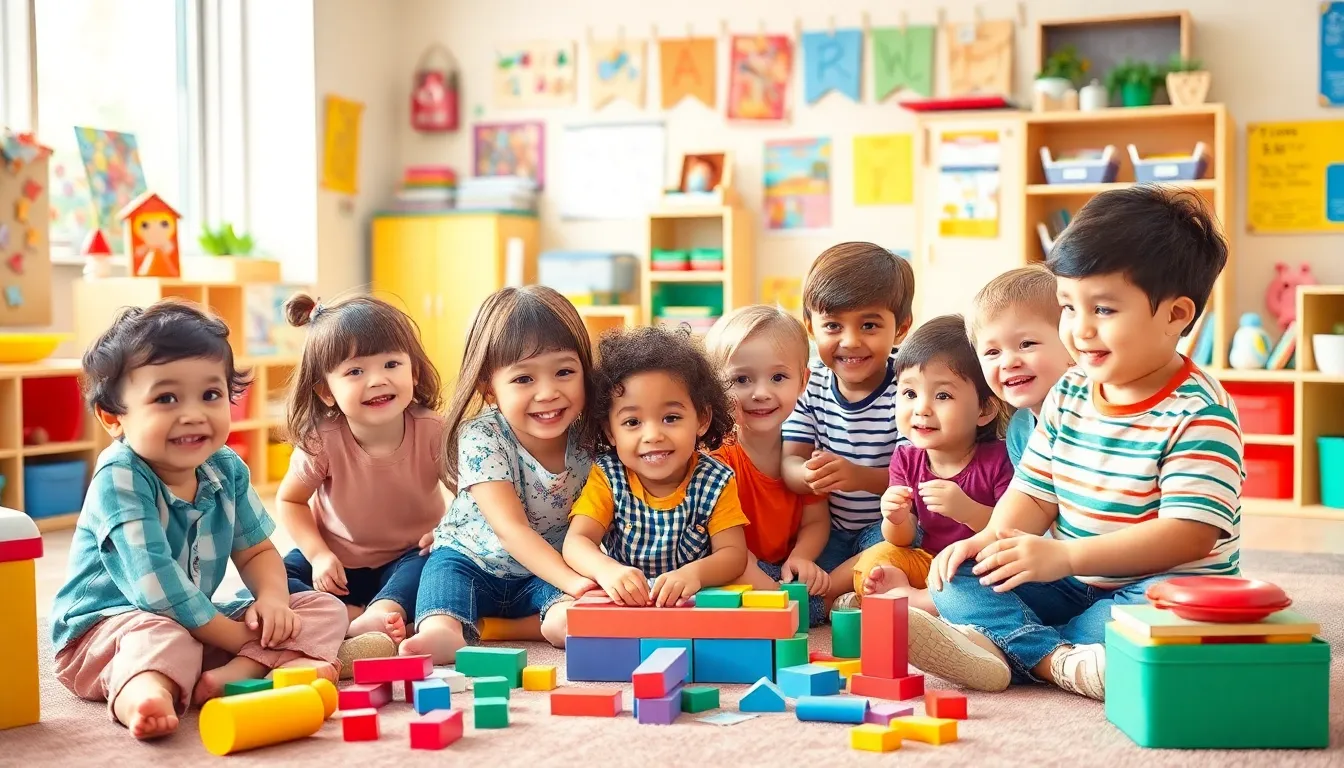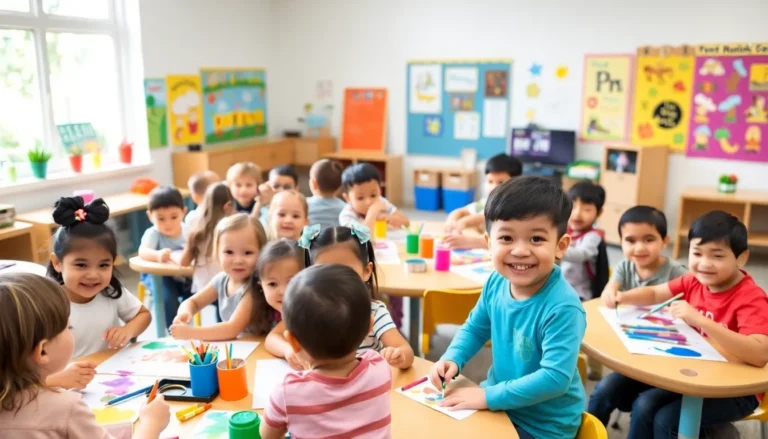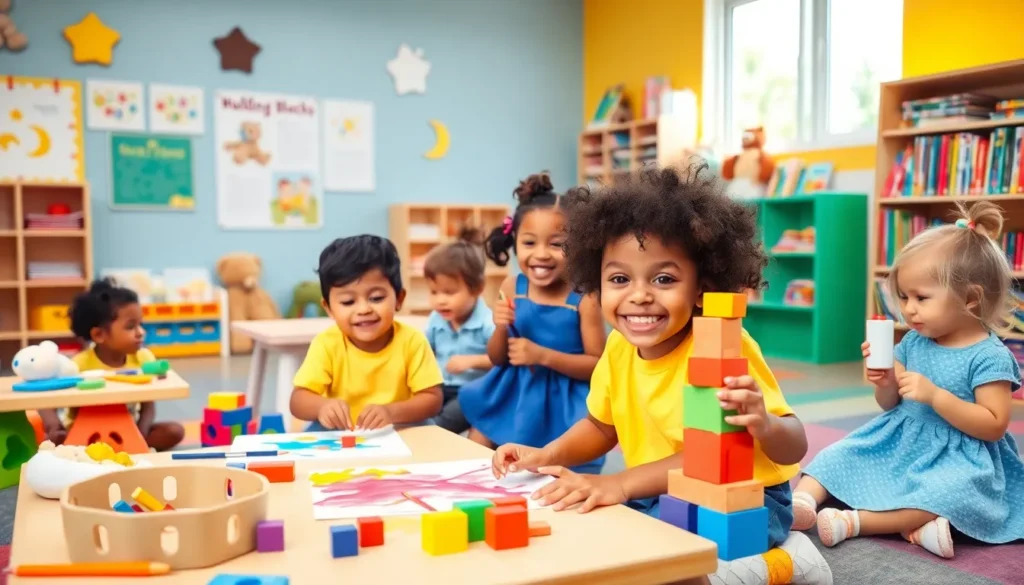Table of Contents
ToggleIn a world where toddlers seem to have more energy than a triple-shot espresso, the Building Blocks Early Learning Center stands out as the ultimate playground for young minds. Here, learning isn’t just about ABCs and 123s; it’s an adventure filled with laughter, creativity, and a sprinkle of chaos. Imagine a place where finger painting is as serious as rocket science and storytime feels like a blockbuster movie premiere.
What Is A Building Blocks Early Learning Center?
A Building Blocks Early Learning Center serves as a nurturing environment for toddlers, focusing on holistic development. Emphasis on hands-on activities ensures that children engage in learning experiences that foster creativity and critical thinking. Learning extends beyond traditional academics, incorporating foundational skills essential for future success. Environments at these centers feature curriculum activities that blend fun with educational objectives.
Activities include imaginative play areas, art stations, and interactive reading corners. Toddlers explore finger painting, building blocks, and storytelling, promoting social interaction and emotional development. Educators facilitate these experiences, guiding children through structured play while allowing freedom for exploration. Classroom setups encourage collaborative learning and peer relationships.
Supportive frameworks at Building Blocks Early Learning Centers focus on fostering independence and self-confidence. Children learn to articulate thoughts, share ideas, and resolve conflicts with their peers. Programs align with developmental milestones, ensuring that each child progresses at their own pace. Assessments occur regularly, providing insights into individual growth and areas for enhancement.
Safety and inclusivity remain top priorities, along with promoting a sense of belonging within the learning community. Facilities often incorporate accessible resources for diverse learners, ensuring that every child can participate in activities. Overall, Building Blocks Early Learning Centers equip young children with essential skills while creating a joyful and enriching educational experience.
Key Benefits Of Early Learning Centers

Building Blocks Early Learning Center offers several significant advantages for young children. These centers serve as a foundation for growth, ensuring children engage in meaningful learning experiences.
Cognitive Development
Cognitive development flourishes in early learning centers. Educators stimulate critical thinking through interactive activities and hands-on experiences. Imaginative play areas encourage problem-solving and creativity, essential skills for future learning. Children grasp early math and literacy concepts through playful exploration, which reinforces their understanding. Regular assessments track individual progress, allowing educators to tailor activities to meet developmental milestones. Engaging in storytime enhances language skills, while creative projects nurture imagination. Overall, early exposure to diverse learning experiences fosters a love for learning.
Social Skills Enhancement
Social skills develop significantly in early learning environments. Children interact with peers, learning to communicate their thoughts and ideas clearly. Collaborative activities teach teamwork, making sharing and cooperation essential elements of their play. Problem-solving in group settings helps resolve conflicts and enhances emotional intelligence. Through structured and unstructured play, children gain confidence, setting the stage for future social interactions. Regular group activities also shape children’s ability to empathize with others. Thus, early learning centers create a strong foundation for effective communication and healthy relationships.
Curriculum Overview
The curriculum at Building Blocks Early Learning Center emphasizes engaging, multi-faceted learning experiences. It incorporates hands-on activities and interactive environments that make education enjoyable and effective.
Play-Based Learning
Play-based learning serves as the heart of the curriculum. Children engage in activities like building blocks, art projects, and imaginative role-play. Through these experiences, they develop motor skills, creativity, and problem-solving abilities. Structured playtime encourages social interaction, fostering communication and collaboration among peers. Educators create atmospheres where exploration and inquiry thrive, allowing children to learn actively. Experiences like group games and storytelling also enhance language development, making learning natural and enjoyable.
Integrated Learning Approaches
Integrated learning approaches enhance the overall educational experience. The curriculum combines subjects such as math, literacy, and science through interactive activities. For instance, a nature walk might lead to discussions about shapes and colors, integrating environmental awareness with basic numeracy skills. Regular assessments inform educators about each child’s developmental progress, ensuring activities align with individual needs. Inclusive practices accommodate various learning styles, fostering a sense of belonging for all children. By connecting concepts across different subjects, children develop a comprehensive understanding of the world around them.
Choosing The Right Learning Center
Selecting the right learning center involves thoughtful consideration of several key aspects. Parents should explore each center’s environment and curriculum to find the ideal fit for their child.
Factors To Consider
Safety measures take precedence. Parents must ensure the center has secure facilities and trained staff. Additionally, accessibility features accommodate diverse learners, promoting inclusivity. Curriculum structure plays a crucial role in early development. Parents should evaluate whether the program emphasizes hands-on learning and play-based activities that foster critical skills. Class sizes also matter, as smaller groups enhance individual attention and interaction. Finally, regular assessments are vital; they ensure the program aligns with developmental milestones, tracking a child’s progress effectively.
Questions To Ask
Parents should inquire about the educator-to-child ratio. A lower ratio often provides more personalized attention. It’s essential to ask how educators plan activities. Understanding their approach helps gauge the center’s commitment to fostering creativity and critical thinking. Questions regarding safety protocols are equally important. Parents need clarity on emergency procedures and daily health checks. Additionally, finding out about communication methods with families ensures transparency and involvement. Centers should also share ways they promote social and emotional development, providing insight into their overall educational philosophy.
Parent Involvement
Parent involvement at Building Blocks Early Learning Center plays a critical role in enhancing children’s educational experiences. Engaging parents in their child’s learning journey promotes a sense of community and strengthens relationships between families and educators. Regular communication between teachers and parents keeps everyone informed about each child’s progress and development.
Volunteering opportunities offer parents hands-on involvement. Parents can participate in classroom activities, helping with art projects or storytime, which enriches the learning environment. These interactions foster connections, allowing parents to better understand their child’s daily experiences and challenges.
Workshops and seminars provide additional avenues for parents to engage. These sessions equip parents with tools and strategies to support learning at home. Topics often include early literacy, social skills development, and positive discipline practices.
Feedback from parents contributes significantly to the center’s improvement. Suggestions for enhancing programs or activities reflect parents’ perspectives, helping educators align their approaches with family values. Open channels for feedback encourage a collaborative environment, ensuring everyone’s voice is heard.
Community events also strengthen parent involvement. Family nights and seasonal celebrations invite parents to share memorable experiences with their children and other families. Such events create a welcoming atmosphere, fostering relationships among families within the center.
Prioritizing parent involvement at Building Blocks Early Learning Center ensures that children receive a well-rounded educational experience. Engaged parents become active partners in their child’s development, enhancing both social and emotional learning. Encouraging parents to participate creates a support network that benefits children, educators, and families alike.
Building Blocks Early Learning Center stands out as a nurturing space where children thrive through creative and engaging learning experiences. Its emphasis on holistic development ensures that each child not only acquires essential academic skills but also grows socially and emotionally.
With a curriculum designed to foster independence and critical thinking, children are encouraged to explore their interests while developing confidence and communication skills. The center’s commitment to safety and inclusivity creates an environment where every child feels valued and supported.
By prioritizing parent involvement and community engagement, Building Blocks cultivates strong relationships that enhance the educational journey. This dynamic approach lays a solid foundation for lifelong learning and personal growth, making it an ideal choice for families seeking quality early education.







